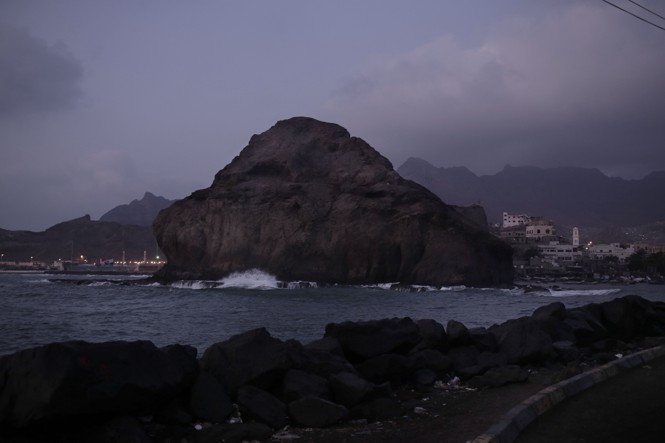
Ahmed Lamlas, the governor of Aden, had been cheerfully describing his progress in rebuilding Yemen’s interim capital—a program aiming to ensure that most cars in the city had license plates was under way, and Saudi-funded projects to rebuild a hospital and dig new water wells were moving forward—when the power went out, plunging the dilapidated conference room into darkness.
“This,” a Yemeni sitting with our small group interjected sarcastically, “is one of the accomplishments.”
Aden is known as the Eye of Yemen, the gateway through which foreign ideas and would-be conquerors enter the country. This southern port city spent more than a century under British rule, connecting London’s imperial possessions in Egypt and India. It fell within the Soviet sphere of influence following the collapse of the British empire, becoming the capital of the Middle East’s only communist state. Now it is under the sway of Saudi Arabia and the United Arab Emirates, and at the center of their efforts to drive back the Houthis, an Iran-backed militia, in Yemen’s long-running civil war.
Even though the Houthis were driven out of Aden seven years ago, it looks as if fighting ended seven days ago. Houses lie in rubble across the city; Lamlas had only enough funds to remove debris from one of eight municipal districts. Across the street from where I stayed, the Aden Hotel—once known for hosting lavish weddings—was half-collapsed from shelling years prior that had left gaping wounds in its facade. Lamlas mused about putting up billboards to boost the morale of citizens frustrated by the slow pace of reconstruction, but as he himself acknowledged, his entire budget would not cover repairs to the Aden Hotel. In November, Yemen’s prime minister promised to repair a single power generator. It remains broken. “We are poor,” Lamlas said simply.
Lamlas’s matter-of-fact comment to me, if anything, understates the despair in Aden, and in Yemen. No one involved in Yemen’s war, at any level, has any significant aspiration for the country. Hopes—to the extent that any exist—are limited to improving the odds of surviving. In Yemen, in Saudi Arabia and the UAE (the dominant powers in non-Houthi areas), in the United States, there is no discussion of how to rebuild Yemen, let alone how to make it thrive as it once did. The grandiose ambitions of the war’s major players were dashed long ago, and yet the conflict still grinds on, leaving a country ruined. The war has created its own logic and its own momentum.
Two weeks into his presidency, Joe Biden described the war here as a “humanitarian and strategic catastrophe.” He had good reason: The Saudi-led air campaign has killed at least 9,000 civilians and precipitated the world’s worst humanitarian crisis, while also failing to dislodge the Houthis from the Yemeni capital, Sanaa. Aden, meanwhile, has seen its economy and security collapse under the rule of Saudi- and Emirati-backed politicians.
The Yemeni government’s poverty has made it dependent on handouts from Saudi Arabia and the UAE. In return, it has ceded no small amount of sovereignty. Ships hoping to dock at Aden’s harbor must first undergo inspection by the Saudi-led Coalition, primarily by passing through the Saudi city of Jeddah, and the decision to grant a foreign journalist like me a visa had to be approved by officials in Riyadh and Abu Dhabi. (The Sana’a Center for Strategic Studies, an independent research institution focused on Yemen and funded by grants from the EU and European states, organized the trip and handled these negotiations.) Even Yemen’s airspace is no longer its own: Our flight to Aden sat on the runway for seven hours, waiting for approval from the Saudi-led coalition to take off.
Yemenis deeply resent this dependency. “This is bullshit,” one fellow passenger yelled as our wait dragged on. “Someone call [Saudi Crown Prince] Mohammed bin Salman!”
The country’s horizons were not always so limited. Some Adenis still remember when the city was the Dubai of its era, prospering from its global commercial links in the dying days of the British empire. Queen Elizabeth II visited in 1954, less than a year after her coronation, hailing the city as an “outstanding example of colonial development.” Decades later, a Yemeni hotel still promoted the legend that she had spent a night in one of its rooms, decking out a “Royal Suite” with photographs of Her Majesty.
If I had visited in the 1950s or ’60s, one older Adeni told me, the bombed-out Aden Hotel would not have been the central landmark in the neighborhood in which I stayed. Instead, I would have seen a neon-lit cinema, the Shenaz, that played that era’s biggest English-language blockbusters, including Ben Hur and Cleopatra. Next door was an adjoining night club, the Shalimar, which imported international bands and German beer. The Shenaz was partially destroyed in the mid-2000s during a property dispute and now sits derelict. The Shalimar has been demolished.
“It was an era where going out was something you did with a bit of aplomb,” Dadi Motiwalla, the eldest son of the Shenaz and Shalimar’s owner, told me. “If you didn’t have a tie or a bow tie, we wouldn’t let you in.”
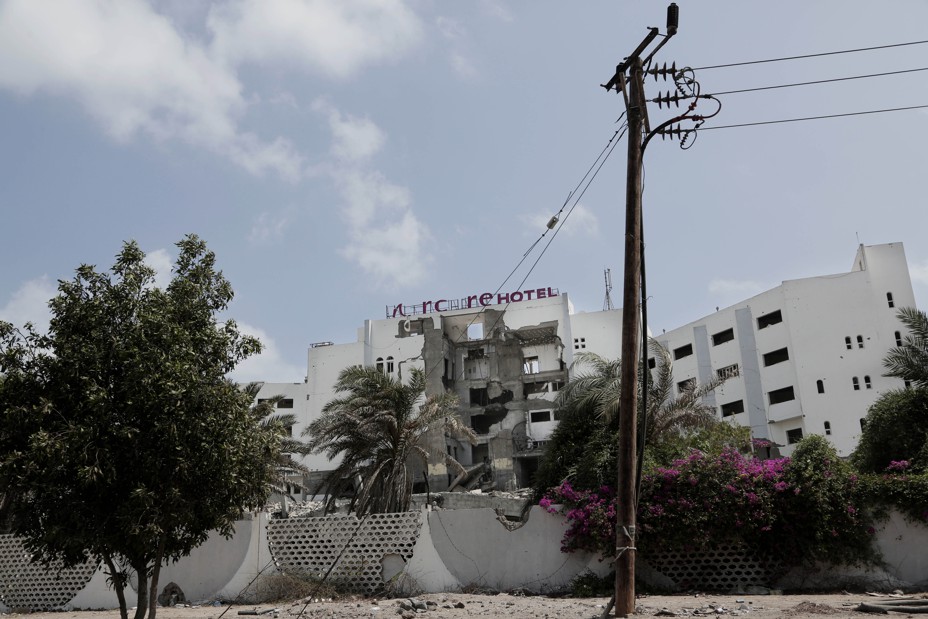
This was once a vital city, Adenis wanted me to know, connected to global commerce and culture. It was a place where one’s aspirations could extend beyond cleaning the streets of rubble. Motiwalla described having his birthdays at the Shalimar: large parties with more than 100 children scrambling around the dance floor, and the chefs making cakes with sugary lakes and toy boats floating upon them.
The cinema’s theme song, he remembers, was “Sail Along Silvery Moon.” “I never forgot that,” he said quietly, choking up. “It brings a lot of memories back.”
Nobody is trying to restore Aden to what it once was. Yemen’s leaders aspire only to hold on to power so that they can wring the few remaining dollars out of state coffers. The wealthy Gulf states involved in Yemen’s war seem only to want the government to limp along ineffectually until they can extricate themselves from the conflict. And the United States’ primary concerns are counterterrorism and the maintenance of its security relationships with Saudi Arabia and the UAE.
There was a time when Saudi leaders imagined that they would swoop in as Yemen’s savior. Mohammed bin Salman launched Riyadh’s military campaign against the Houthis a mere two months after he was appointed defense minister, and the 2015 intervention became integral to the young prince’s rise to power. He argued privately that the kingdom’s old guard—including his chief rival, then–Crown Prince Mohammed bin Nayef—had failed to stop the Houthis’ rapid gains across Yemen in the preceding year. It now fell to him to take the sort of bold actions that his elders refused to contemplate. The Houthis, and by extension Iran, had to be stopped.
MBS cultivated an image of himself as a decisive, dynamic military leader. The kingdom’s official news agency published photographs of the prince flying on a military helicopter to inspect army positions near the Yemeni border, and Saudi television broadcast clips of him overseeing the campaign’s first air strikes from an air-force operations center. He claimed that the Saudi-led coalition could “uproot” the Houthis “in a few days” if it chose to do so, and posters touting him as a military leader proliferated across Riyadh.
By 2019, however, the Saudis had what one analyst described to me as a “come to Jesus” moment about the war’s trajectory. Their military campaign had stalled, their local allies were weakened, and Houthi missile and drone strikes on Saudi territory were becoming deadlier. MBS, now firmly ensconced as crown prince, stepped back as the public face of the war and charged his younger brother with negotiating an end to the conflict with the Houthis.
That diplomatic opening paved the way in April of this year for the first nationwide truce since 2016 in Yemen’s war. Although the agreement has resulted in a notable decline in violence, U.S. diplomats acknowledge that it does not address the root causes driving the war. Fundamental questions about how to share political power and rebuild the country’s shattered institutions remain unresolved. The current diplomatic goal is to freeze the conflict in place, in the hope that this will open the door to broader political negotiations.
For many people whom I spoke with in Yemen, however, that risks simply freezing their lives in an impossible situation. In an encampment overlooking an abandoned stretch of Aden’s beachfront, for example, a community of Ethiopian refugees has suffered multiple displacements, by multiple tormentors: First they were driven from their home country by ethnic conflict there, then out of Sanaa by the Houthis, and finally they were dumped in Aden and forced to fashion shelters out of tree branches and roadside debris.
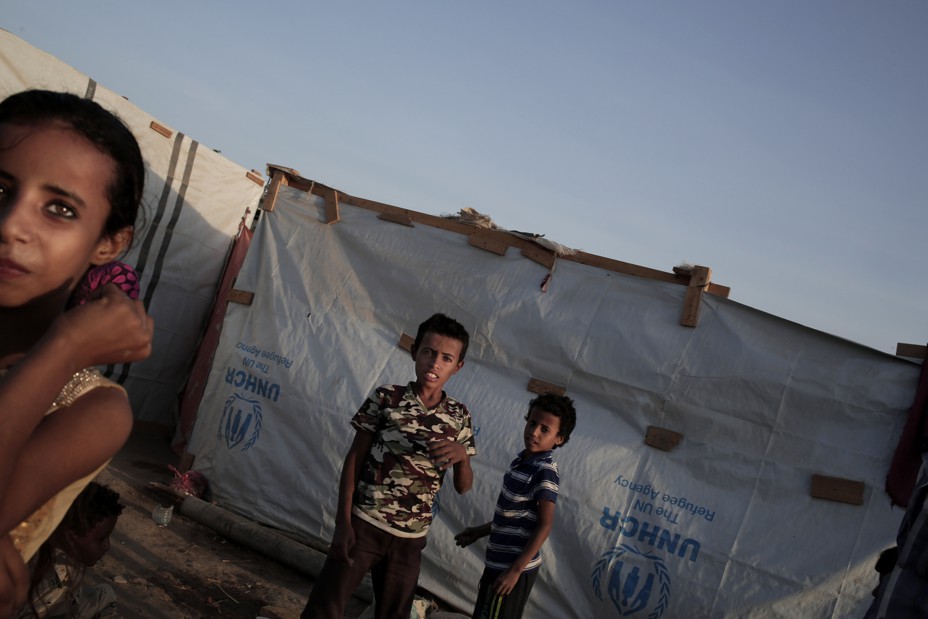
Beyza, 22, remembers only life in Yemen. She and her mother fled across the Red Sea in 2004, settling in Sanaa when her mother found work cleaning houses there. After the Houthi takeover of the capital, however, the Islamist movement came to see the Ethiopian community as a humanitarian burden and, later, as transmitters of the coronavirus. Beginning in 2020, the Houthis began sending refugees on forced marches to the Saudi border and locked up others in detention facilities.
When refugees protested against their dismal conditions in the detention center, Houthi fighters locked the facility doors and launched projectiles inside that ignited a raging fire. International organizations reported that scores of people burned to death; the refugees in Aden insisted to me that the true death toll was in the hundreds. A tattered poster featuring gruesome images of the fire’s aftermath and demanding justice for the victims still hangs outside the encampment I visited.
The community launched protests outside the United Nations refugee agency’s headquarters in Sanaa to demand support for the families of those who died. The Houthis, unwilling to condone even this minor expression of dissent, came for the protesters at dawn on a Friday morning. “They took everyone,” Beyza told me. “Those who could pay 2,000 Saudi rials [$533], they took to the passport center. If they didn’t pay, they took them to the front line.”
Beyza and her mother handed over their meager savings to the Houthis. From the passport center, they were placed on buses and transported out of the group’s territory to Aden. “They took our photos and said, ‘If you come back to Sanaa, you will be killed,’” said Beyza. “Some people’s children were still in Sanaa, and they couldn’t go back for them.”
In Aden, the beleaguered Ethiopian community now suffers more from neglect than abuse. Its members had to construct their own rudimentary shelters, and say they received little to no humanitarian assistance from the Yemeni government or international organizations. They beg for food at nearby restaurants and gather water from a broken pipe at a nearby derelict hotel.
Abandonment, too, can be deadly. One 33-year-old Ethiopian, Jawar, told me how his seven-month-old son fell ill and died due to the lack of basic medicine. He could not find anywhere to bury him, so he pleaded with a guard at the nearby hotel to lay his son to rest in the garden.
“This is what it is like here,” Jawar said quietly. “Children are born, and children die.”
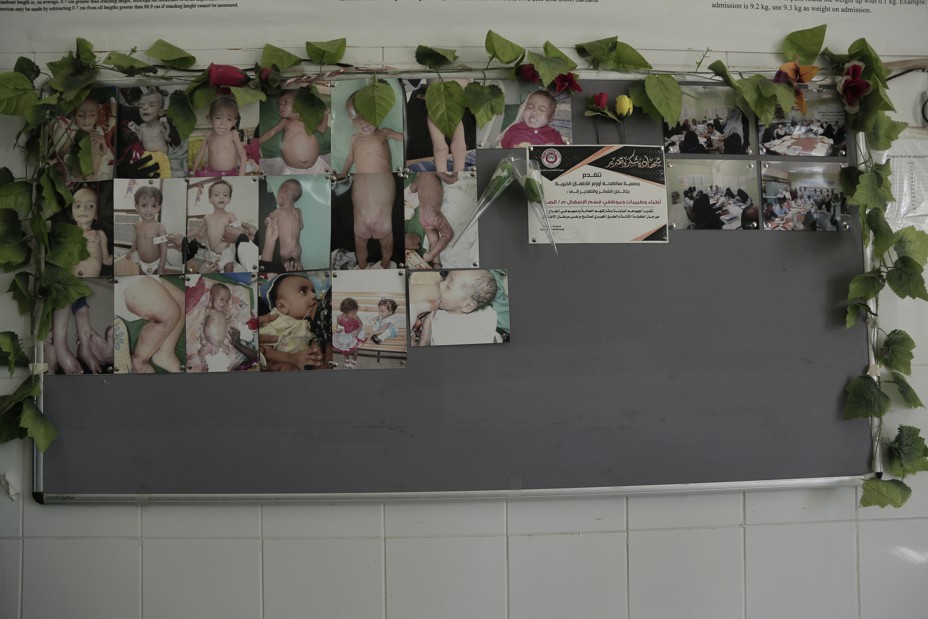
Eight years into this conflict, any hope of a decisive victory has vanished. Many Adenis I interviewed have grown cynical about the point of this seemingly pointless war: It only continues, they say, to justify a small elite’s grip on power and continued looting of state coffers.
I have been covering and studying this war—first from Beirut, then from Riyadh, and now from Washington, D.C.—since its inception and, frankly, that explanation is as good as any. The Gulf Arab states have abandoned the pretense that they will deal a death blow to Iranian expansionism; MBS has secured his position in the Saudi hierarchy; the Houthis’ boasts that they would win a swift victory over their foes have been proved false. What better reasoning can I put forward than that proffered to me by those Adenis?
Last year, retired Brigadier General Naji al-Arabi found himself leading a group of angry protesters massed outside Aden’s presidential palace. Inside, Yemeni leaders were meeting. As the protesters approached, the soldiers at the gate fired warning shots to disperse the crowd. The demonstrators, many of them military veterans like Arabi, didn’t back down: They surged forward toward the entrance, and after a brief scuffle the guards stepped aside and allowed them to enter the palace.
“We didn’t know the government was having an emergency meeting,” Arabi told me. “We just heard the helicopters flying away.”
The Yemeni government fled shortly after the palace gates were breached. The protesters soon departed peacefully, returning to a nearby mosque to read their list of demands, calling on the government to improve the dismal living conditions in the city. It made little difference: An atmosphere of imminent collapse and simmering revolt still hangs over Aden.
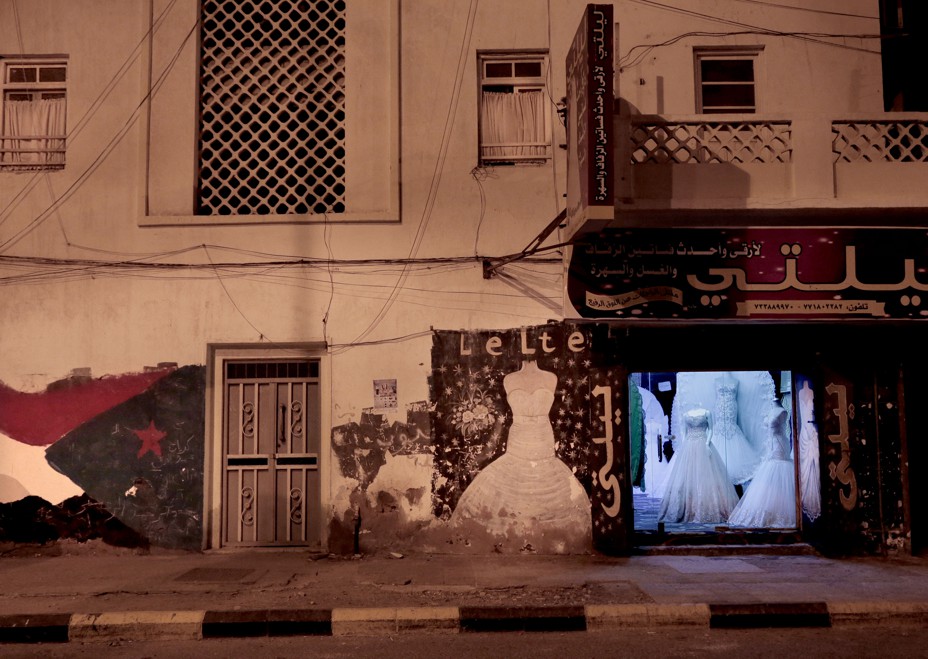
Arabi, a blunt man who wears a perpetually exasperated expression, joined the army in 1978. He trained in the Soviet Union for three years until being forced into retirement in the ’90s, after the unification of South Yemen and North Yemen. He and thousands of his comrades now survive on their pensions: Arabi is owed roughly $30 a month.
But even this paltry sum comes in rarely. In 2016, Arabi and fellow ex-soldiers formed a protest movement to pressure the government to pay its debts to veterans. Since the protesters breached the palace, Arabi says he has not received a cent.
Arabi has eight children who depend on his pension for their survival. Some of his sons now chop wood to make ends meet during the long stretches when the money does not arrive. Many well-trained military officers have similarly been forced to scratch out a living by whatever means necessary. “You can find a fighter pilot watching over sheep, or selling newspapers or cigarettes,” Arabi said.
In addition to pressuring the government and its foreign patrons, the protest movement is a way for officers like Arabi to maintain some influence over the thousands of desperate ex-soldiers abandoned by the Yemeni state. Arabi fears that, without any way of supporting themselves, some of his former comrades could drift into Islamist militancy or work for criminal gangs to earn a living. In fact, he believes that the government is hoping they do, as it would then have a pretext to crack down violently on the protest movement.
“We think the government is trying to repress us so that people will use their weapons to sabotage and to steal,” he said. “They are trying to create new front lines to keep the war going, to feed on it.”
The movement has sputtered in recent months, however, as its members grow further impoverished. Arabi admitted that it has become difficult to persuade veterans to bear the costs of leaving their home in the countryside to travel to Aden for protests. With their pensions gone, members are devoting their energies to simply surviving. If Yemen’s leaders hope to silence the protest movement by starving it of resources, as Arabi believes, they may soon get their wish. But it will be a Pyrrhic victory.
Arabi and his fellow soldiers will not be the last victims of Yemen’s collapse. Spend any time at all in Aden, and you will find a whole new generation furious at the impossibility of building a life here: There are the medical students without textbooks or functional internet, the psychiatrist specializing in conflict trauma who had his desk taken away by university administrators, and the government official who works from home because heavily armed men occupy his office. The list goes on.
If you listen to diplomats, this moment constitutes a hopeful one for Yemen. The truce is for the most part holding, in no small part because of coordination between U.S. and Saudi diplomats. When it was renewed in June, Biden praised Saudi Arabia’s “courageous” diplomatic efforts. His administration is now trying to leverage its ties with the Saudis to forge a permanent peace agreement.
For residents of Aden, however, international diplomacy often seems divorced from the daily struggles of life. So much has already been lost. What remains feels ephemeral. And there is only one employer that is always hiring.
Standing in the courtyard of the University of Aden, I asked a medical student what would happen if he couldn’t find work after graduation. “There’s always the war,” he said. “You can make 1,000 Saudi rials [$266] each month as a fighter.”
In Aden, your salary and savings can shrink to nothing; your physical security can be threatened at a whim; even electricity is fleeting. But the front line is a constant, fixed reality, and it’s not going anywhere.
